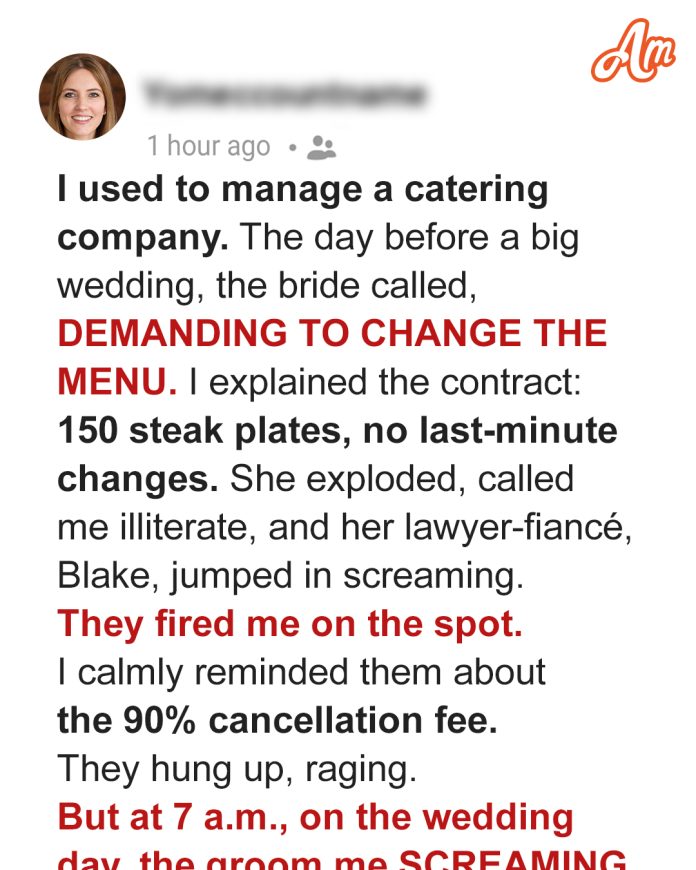The day before their wedding, a couple found themselves in the midst of a kitchen catastrophe that could easily belong in a movie. All had seemed right: invitations sent, guests confirmed, the venue arranged, and a top-tier caterer hired. Everything pointed to a smooth, elegant celebration. The contract they signed was clear and detailed: 150 steak plates at $50 each, totalling a hefty catering commitment. It was billed as the centerpiece of the event—classic, refined, designed to delight their guests.
The woman managing the catering company, under mounting pressure due to her boss’s health, had taken charge of the operation. It was her debut overseeing a large-scale wedding event fully on her own, and she was determined to rise to the occasion. Her boss was undergoing chemotherapy, so she stepped up—to show she could lead, deliver quality service, and keep their business afloat.

In the kitchen that afternoon, everything was running per plan. Chefs were trimming steaks, sauces gently simmered on the stove, sides were lined up, prep lists were being checked off. The air smelled richly of garlic, char, and success. She felt confident. Then her phone buzzed. On caller ID: Camille—the bride.
Instantly, that expert calm vanishes. She answered, expecting a small detail to discuss, but instead Camille demanded the menu be changed entirely. Gone were the stylish steak plates they had carefully chosen. Instead—seafood. Salmon or sea bass, something “elegant.” In other words, something entirely new.
Confused, the catering manager explained that it was far too late. All the ingredients had been bought weeks ago, the steaks were already being trimmed and seared. The kitchen was humming with precision and intent. The contract clearly forbade changes within a month of the event, and here they were, just a day out. Camille wouldn’t hear it. She raised her voice, insulting the manager’s competence and literacy. And when the manager stuck to the terms—reminding Camille of the binding contract—Camille threatened legal action. Her fiancé, Blake—a lawyer—took the phone and escalated the issue, drowning the manager in bursts of entitlement and aggressive language.
By the time the call ended, the couple had officially fired the caterer. They assumed they could sweep in a new vendor and demand seafood instead. But there was a clause in their signed agreement: cancel with less than 24 hours’ notice, and you owe 90 percent of the total. The manager calmly reminded them. Blake responded with a derisive laugh and ended the call.
In that kitchen, a dozen staffers fell silent. “What do we do now?” Miguel, the lead cook, asked. The manager paused, looked at the trays and pans, then issued a firm instruction: “Finish everything as planned.” So they worked well into the night, plating and preparing as if the event were still happening. Then she sent the crew home, ready to roll at dawn with or without the client.
At around 7 a.m., her phone rang. It was Blake. Panic in his voice, he demanded they show up with the food or they’d be sued—for breach of contract. This was the moment the manager had anticipated. She calmly explained that since they had terminated the contract, the only way to resume service was a new contract, at triple the price, with payment upfront. Menu? Exactly what was prepared. Pick steak or walk away.
Silence. Then Blake sputtered “extortion,” but grudgingly agreed. They signed the new papers and handed over the money. The manager pressed on: service wouldn’t continue under abusive behavior—hinting that they were ready to walk again. Blake conceded. The deal was on. Exactly as it had to be.

At noon, they arrive at the venue. The manager corners Blake, insisting on seeing the signed contract and payment. He signs it, clearly not thrilled. Meanwhile, tensions began seeping into the venue. Her assistant, Jen, later recounted how Blake had harassed Miguel, threatening him with deportation if anything went wrong. Furious, the manager marched over to Blake and publicly warned: “Threaten my staff again, and we walk—contract or no contract.” Blake glared back, but the warning held.
From that point on, service was impeccable. The steaks were cooked to perfection, arrival was on time, plating and staff presentation were flawless. The wedding seemed to proceed as planned, guests complimented the food, and the couple stayed distant—never once speaking with the catering manager directly.
Three weeks later, the caterer received news: Blake was suing them for “predatory pricing” and breach of contract. The manager handed all documents and recordings to their lawyer: the signed originals, the new contract, phone logs, staff testimonies. The judge ruled immediately in favor of the caterer, even ordering Blake to pay their legal fees—with a pointed comment: bullies won’t find sympathy in court, especially from trained professionals.
Her boss, newly recovered, congratulated her on a triumphant feat: she had earned more in one wedding than many others they did combined. She joked that his sickness had actually been a boon for the business. He laughed, cried, and suggested she keep healthy—because they served profitably on her watch.
Finally, curiosity led the manager to check Camille and Blake online. She discovered their marriage had ended—divorced in under three years. A quiet, personal victory that echoed the justice of destiny.

















